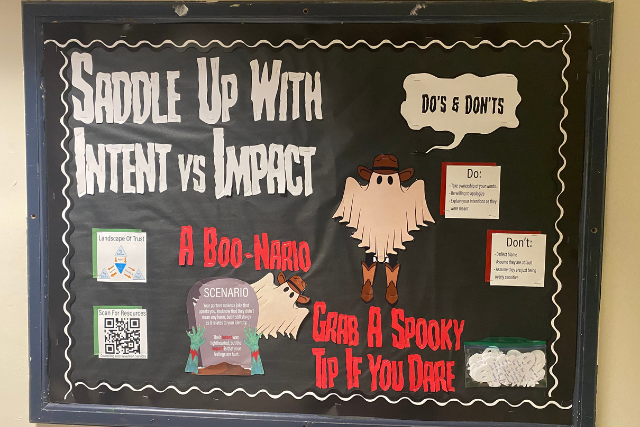The Division of Inclusive Excellence challenged TCNJ’s Community Advisors to a bulletin board contest in the residence halls. The goal was for CAs to design displays to help educate their residents about important topics such as implicit bias, microaggressions, intent, and impact.
In addition to adding color and energy to the residence halls, the bulletin boards provide residents with tools they can use to confront uncomfortable situations — like how to respond if someone tells you that your words had a negative impact on them. The boards encourage residents to avoid phrases like “I’m sorry if” or “I’m sorry but” and instead to focus on the other person’s feelings and listen to understand. The boards serve as a reminder to acknowledge the impact that words can have, despite the intention behind them.
“Bulletin boards serve as an important tool for us to educate our residents as they go about their lives in the residence halls,” says Christopher Trautman, associate director of residential education and housing. “The boards are visually engaging ways to educate residents about topics critical to their development as scholars and responsible citizens in our community.”
Luca Bottitta ’24, a CA in Ely Hall, created a Taco Bell-themed board. The biology secondary special education major used classic spice levels (mild, hot, and fire) to identify the best (and worst) responses to a conflict.
“Making bulletin boards is a rewarding process. It starts out with a vision and then it comes to life,” says Bottitta. “In my building, putting up the bulletin boards is also a mini-community event. I always have a few residents that sit with me when I make them and other residents will walk by and engage in the content.”
Cler Cezar ’24, visual arts and graphic design major and CA in Centennial Hall, designed a spooky-themed board with clip-art gravestones, green zombie arms, and letters that appear to be trembling like ghosts. It provides her residents with the “Dos” and “Don’ts” of conflict: Do explain your intentions as they were meant, don’t assume they are just being overly sensitive.
Cezar took home the gold for this eerie presentation.
“I want to enhance communication and to keep residents informed of the potential impacts of their behavior,” says Cezar. “As a way to promote awareness amongst residents I provided some ghostly tips on how to gauge their reactions to various situations. I hope my board would promote personal development, a better understanding of intent versus impact, and foster a more vibrant social environment.”
— Corinne Coakley ’25

